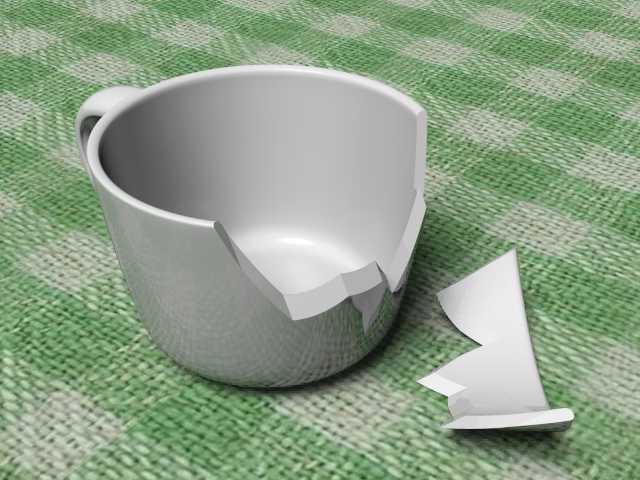 My grandmother’s coffee cup is one of the few things I have that belonged to her. She died when I was seven.
My grandmother’s coffee cup is one of the few things I have that belonged to her. She died when I was seven.
When I inherited the cup, I was too young to use it for its intended purpose, so it was a milk cup or a water cup, but once I went to college, it became again a coffee cup or—more to the point—my coffee cup. Or at least briefly it became my coffee cup before my roommate Lily kno
ked it off my desk, and it broke into at least four pieces.
I cried. Then I went to the drugstore, bought some superglue, and put it back
together, except one little piece which was too small and shattered to fit back into place.
Now, it is–and always will be–my grandmother’s coffee cup, though it doesn’t hold anything except old buttons and memories of my grandmother in her kitchen at the table with the vinyl tablecloth and wagon wheel chandelier, drinking cup after cup of Sanka.
Sometimes, it’s only when something’s been broken, that we realize how very precious it was. At times, it’s only when something’s been broken that it becomes precious.
Few of the heroes of the Old Testament are as broken as Gideon. When we first meet him, he’s a timid, insecure young man, demanding proof of his call from God. (Judges 6:17) Later, he dies having turned the worship of Israel to false gods. (Judges 8:27) Every time he seems to be getting it right, he messes up, and yet he talks with God and saves his people. His story is proof that, despite our very worst character flaws and most egregious failures, God can still accomplish God’s will through us—and sometimes in spite of us.
God’s in charge, after all—not Gideon—and, ultimately, the crazy bunch of Israelite tribes, scattered all over ancient Palestine, come together under one God, into one nation, under one king. God is at work despite the imperfections and in the imperfections, and it’s because of these imperfections that we recognize God’s power as the source of victory. Thanks be to God for Gideon, and all the rest, and all their imperfections!
I know that there are some of you, even today, who are wrestling with your imperfections. You know you could do more; you wish that you could do better. Don’t settle for less: call on God’s power to help you overcome them, but don’t despair. The God who came to us in the imperfect flesh of a carpenter understands our burden. We might get stuck, so God nudges us; we respond. God nudges us some more, and we move a little farther. We might get sidetracked altogether, so then God grabs us and brings us back and keeps us going. Our imperfections are God’s opportunity to remind us of His love and His grace. It’s in our imperfections that God’s perfection is most clearly in evidence.
No, this is not a license to go out and practice our imperfections. The apostle Paul asks the question to the Romans, “Shall we go on sinning so that grace may increase?” (Ro. 6:1) The answer of course is no. God calls us to live in the Spirit and to strive for what is good and true. God wants us to be loving and honest, patient and kind and humble and hard-working. God wants us to put our faith in Christ alone. Still, there is none of us who will not battle our demons.
Here is the reassurance—Gideon’s reassurance—that God is stronger than our strongest weakness.



Leave a Reply